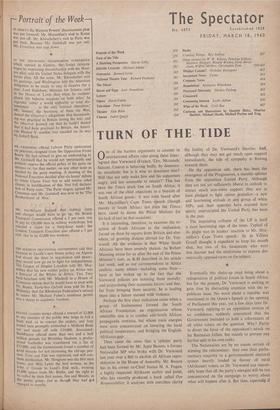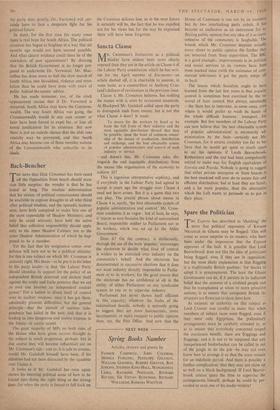TURN OF THE TIDE
ONE of the hardest arguments to counter in international affairs runs along these lines: 'agreed that Verwoerd (Franco, Tito, Nkrumah, Salazar, Castro) is behaving badly, by democra- tic standards; but is it wise to denounce 'him? Will that not only make him and his sujiporters angry, and less amenable to reason?' This has been the Times stock line on South Africa; it was one of the chief objections to a boycott of South African goods: it was ev'en heard after Mr. Macmillan's, Cape Town speech (though mainly in South Africa: not even the Times, here, cared to damn the Prime Minister for his lack of tact on that occasion).
It is interesting, therefore, to examine the re- action of South Africans to the realisation, forced on them by reports from Britain and else- where, of growing distaste abroad for Dr. Ver- woerd. All the evidence is that White South Africans have been severely shaken. As Robert Manning wrote for us after the end of the Prime Minister's tour, as K-H described in his article last week, and as our correspondents in Africa confirm, many whites—including some Nats- have at last woken up to the fact that the Verwoerd policies are isolating them morally, and jeopardising their economic future; and that, far from bringing them security, he is leading them into a future stained with violence.
Perhaps the first clear indication came when a group of businessmen formed the South African Foundation, an organisation whose ostensible aim is to combat anti-South African propaganda overseas, but whose main energies were soon concentrated on lowering the local political temperature, and bridging the English- Afrikaans gap.
Then came the news that a splinter party had been formed by Mr. Japie Basson, a former Nationalist MP who broke with Dr. Verwoerd last year over a Bill to abolish all African repre- sentation in the House of Assembly. Mr. Basson has in his corner ex-Chief Justice H. A. Fagan, a highly respected Afrikaans author and jurist, who has recently produced a book called Our Responsibility; it analyses with merciless clarity the futility of Dr. Verwoerd's theories. And, although they may not get much open support immediately, the tide of sympathy is flowing towards them.
On the opposition side, there has been the emergence of the Progressives, a sizeable splinter from the opposition United Party. Although they are not yet sufficiently liberal in outlook to attract much non-white support, they are at least pledged to fight colour prejudice—a new and heartening attitude in any group of white MPs; and their speeches have exposed how utterly unprincipled the United Party has been in the past.
The impending collapse of the UP is itself a most heartening sign of the times. Typical of its plight was its leaders' reaction to Mr. Mac- millan's Cape Town speech: Sir de Villiers Graaff thought it expedient to keep his mouth shut, but two of his lieutenants who were less discreet had the misfortune to express dia- metrically opposed views on the subject.
Eventually this shake-up must bring about a redisposition of political forces in South Africa; but for the present, Dr. Verwoerd is seeking to gain time by distracting attention with the re- publican issue. No word about a republic was mentioned in the Queen's Speech at the opening of Parliament this year, yet a few days later Dr. Verwoerd, replying to an opposition motion of no confidence, suddenly announced that the Government intended to hold a referendum of all white voters on the question. Why? Partly to divert the force of the opposition's attack on his Bantustan follies; but mainly to prevent any further split in his own ranks.
The Nationalists are by no means certain of winning the referendum : they owe their parlia- mentary majority to a gerrymandered electoral system heavily loaded in favour of rural (Afrikaner) voters, so Dr. Verwoerd can reason- ably hope that all the party's energies will be too concentrated on the campaign to worry about what will happen after it. But then, especially if the party dues poorly, Dr. Verwoerd will cer- tainly have to face a desperate fight for his political future.
In short, for the first time for many years there is real hope for South Africa. The political situation has begun to brighten in a way that six months ago would not have seemed possible. And what clearer evidence could there be of the unwisdom of past appeasement? By showing that the British Government is no longer pre- pared to underwrite Dr. Verwoerd, Mr. Mac- millan has done more to halt the slow march of South Africa into bloodshed, violence and revo- lution than he could have done with years of polite behind-the-scenes advice.
He has made nonsense, too, of the stock -appeasement excuse that if Dr. Verwoerd is thwarted, South Africa may leave the Common- wealth. The way South Africa was going, the Commonwealth would in any case sooner or later have been forced to expel her, or lose all moral justification for its existence. But now there is just an outside chance that the slide into anarchy may be prevented, and that South Africa may become one of those member nations of the Commonwealth who subscribe to its ideals.



































 Previous page
Previous page